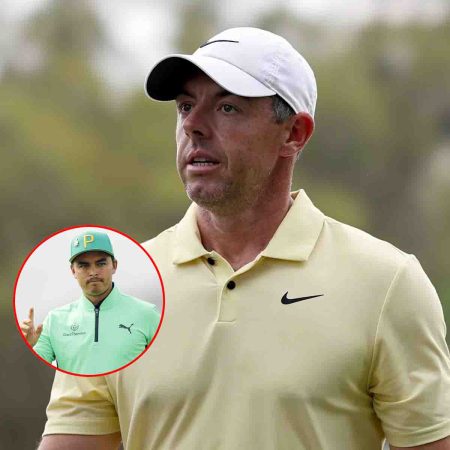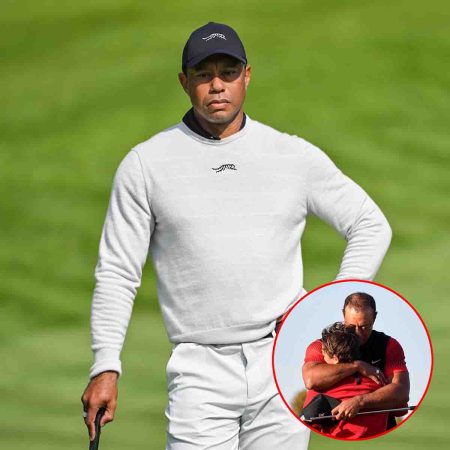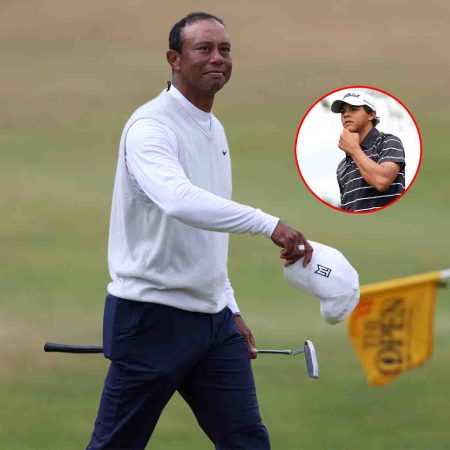Along with the Finals MVP award, the MVP is one of the most prestigious individual awards that can be given out to any player for their performance in a given season. In order to win the MVP, a player must be among an elite group of league leaders while also being the driving force behind a team’s success. Throughout history, the MVP has been one of the best players in the NBA who stands out on one of the best teams in the NBA for any particular year. Of course, throughout history, there can also be plenty of cases to be made that a player was snubbed of the MVP or someone else less fitting took home the award.
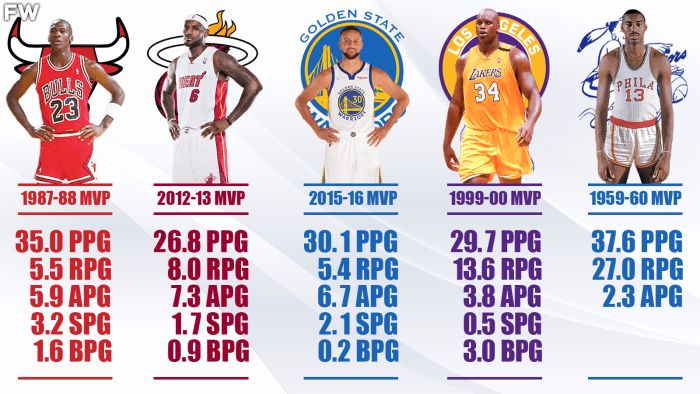
As for these 10 cases below, they are the complete opposite. The 10 MVP seasons to be discussed below are the best in NBA history, unequivocally and unanimously. These 10 seasons completely embody the most important word that is stated right in the award’s name, valuable. Without these 10 performances, history would be altered, and teams may not have ended up having historical finishes to their seasons as they played out before our very eyes. These 10 seasons made NBA history and are forever immortalized with an MVP award to show for it.
These are the 10 greatest MVP Seasons in NBA history.
Honorable MentionKevin Garnett – 2004 MVP Season
2003-04 MVP Stats: 24.2 PPG, 13.9 RPG, 5.0 APG, 1.5 SPG, 2.2 BPG
Kevin Garnett is a high school to NBA success story that became one of the top forwards in the league fairly quickly. Garnett was as versatile of a player as we had ever seen from the power forward position, able to impact the game in a positive way in a number of ways. Garnett was a consistent scorer, rebounder, playmaker, and elite defender during his prime with the Timberwolves, which resulted in an MVP season in 2004.
Garnett averaged a league-leading 13.9 RPG during the 2004 season and recorded 71 games with at least 10 rebounds. It was the first rebounding title out of four he would have in his career. Not only was Garnett elite on offense and rebounds, but his defense was among the best in the NBA as well. He recorded 16 games with at least three steals and 28 games with at least three blocks while leading Minnesota to a 58-24 on the season. Garnett and the Timberwolves would advance to the Western Conference Finals but fall in six games to the Lakers.
10. Allen Iverson – 2001 MVP
2000-01 MVP Stats: 31.1 PPG, 3.8 RPG, 4.6 APG, 2.5 SPG, 0.3 BPG
Standing just 6’0’’ tall, it was almost impossible for Allen Iverson to go down as the legend he did during his stellar NBA career. Iverson did not let his height get in his way during his prime, winning four scoring titles and earning 11 All-Star selections with seven All-NBA Team selections. The 2000-01 season was special for Iverson and the 76ers as they maneuvered a tough Eastern Conference to earn 56 wins, led by Iverson’s two-way play and impact on the floor.
Iverson earned his second scoring title during the 2000-01 season averaging 31.1 PPG. Iverson has two games with 50 points or more that season and 17 games with 40 or more points. On the defensive side of the ball, he recorded 36 games with at least three steals and six games with five or more steals. Iverson would carry the offensive load for Philadelphia all the way to the NBA Finals, where they would meet the powerhouse Lakers. Iverson led the Sixers to a Game One win, but it was not enough to overcome the Shaq and Kobe connection. Iverson’s MVP is still remembered as one of the most impressive wins of the 2000s.
9. Oscar Robertson – 1964 MVP
Credit: Fadeaway World
1963-64 MVP Stats: 31.4 PPG, 9.9 RPG, 11.0 APG
Oscar Robertson was a bit of a do-it-all point guard during his career for the Cincinnati Royals and Milwaukee Bucks. Robertson was an elite scorer and playmaker, but perhaps the most impressive thing about his game was his rebounding rate amongst a league filled with elite big men. Robertson had flirted with an MVP before his 1964 win, such as in 1962 when he averaged a triple-double for the entire season and when he won assists titles in 1961 and 1962 as well.
Robertson’s 1964 season was just as impressive as any other season he had in his career. As for his scoring, Robertson had 44 games with at least 30 points and 11 games with at least 40. He would record 52 games with at least 10 assists and 11 games with at least 15 assists. Robertson would also have 39 games with at least 10 rebounds and 11 games with at least 15 rebounds. His all-around dominance led the Royals to 55 wins on the season. The Royals’ great season would be stopped during the Conference Finals by the Boston Celtics, who would go on to win the NBA championship over the Warriors in five games.
8. Russell Westbrook – 2017 MVP
2016-17 MVP Stats: 31.6 PPG, 10.7 RPG, 10.4 APG, 1.6 SPG, 0.4 BPG
The 2016-17 season was supposed to be a wash for Russell Westbrook and the Oklahoma City Thunder. After blowing a 3-1 lead in the Conference Finals to Golden State, their biggest star, Kevin Durant, decided to join the opposition putting his former team in limbo for the foreseeable future. The Thunder turned to their versatile and explosive point guard to lead them, and that is exactly what he would do, taking back the title of the franchise’s greatest player in the process.
The 2016-17 season was one that saw Westbrook make history as the first man to average a triple-double in a season since Oscar Robertson in 1962. Westbrook would win the second scoring title of his career in 2017, averaging 31.6 PPG and recording 44 games with at least 30 points and 18 games with at least 40. He also had 50 games with at least 10 assists and 54 games with at least 10 rebounds. Westbrook’s effort led the Thunder to 47 wins in 2017 and led them to a playoff berth. Unfortunately, the Rockets, led by James Harden, would eliminate them in five games to end their magical run.
7. Kareem Abdul-Jabbar – 1971 MVP Season
Credit: Malcolm Emmons-USA TODAY Sports
1970-71 MVP Stats: 31.7 PPG, 16.0 RPG, 3.3 APG
The 1970-71 season marked just the second season of Kareem Abdul-Jabbar’s career and would be one still talked about 50 years later in the present. Kareem had already had one of the greatest rookie seasons ever in 1970 and cruised to a Rookie of the Year win. Now, in 1971, the Bucks had added Oscar Robertson to their lineup, making Kareem the most dangerous force in the NBA.
The scoring was aplenty for Kareem during the 1971 season as he went on to win his first career scoring title. He recorded 46 games with at least 30 points and 10 games with at least 40 points. He would also have 19 games in which he grabbed 20 or more rebounds and 53 games with at least 15 rebounds. Kareem would help the Bucks win their first NBA championship latrine the season, becoming one of the first players ever to win MVP, an NBA championship, and Finals MVP in the same season.
6. Michael Jordan – 1996 MVP Season
1995-96 MVP Stats: 30.4 PPG, 6.6 RPG, 4.3 APG, 2.2 SPG, 0.5 BPG
The 1995-96 season would be a historic comeback for the greatest player ever. After taking nearly two years off, Jordan returned to the Bulls’ lineup for the 1995 playoffs. After an unceremonious exit at the hands of the Magic, Jordan was determined to put the NBA back on notice that this was his league and the road to the NBA title ran through him and the Chicago Bulls. That is exactly what unfolded in 1996.
Michael Jordan would have his best overall season ever, leading the Bulls to an NBA-record 72 wins. He won the eighth scoring title of his career averaging 30.4 PPG, and recorded 48 30-point games, nine 40-point games, and one 50-point game during the season. He averaged over 2.0 SPG for the 10th time in his career and had 36 games in which he recorded at least three steals. Jordan would not only lead the Bulls to regular season glory, but eventually, they went on to become NBA champions for the fourth time, with Jordan claiming his fourth Finals MVP award as a result.
5. Wilt Chamberlain – 1960 MVP Season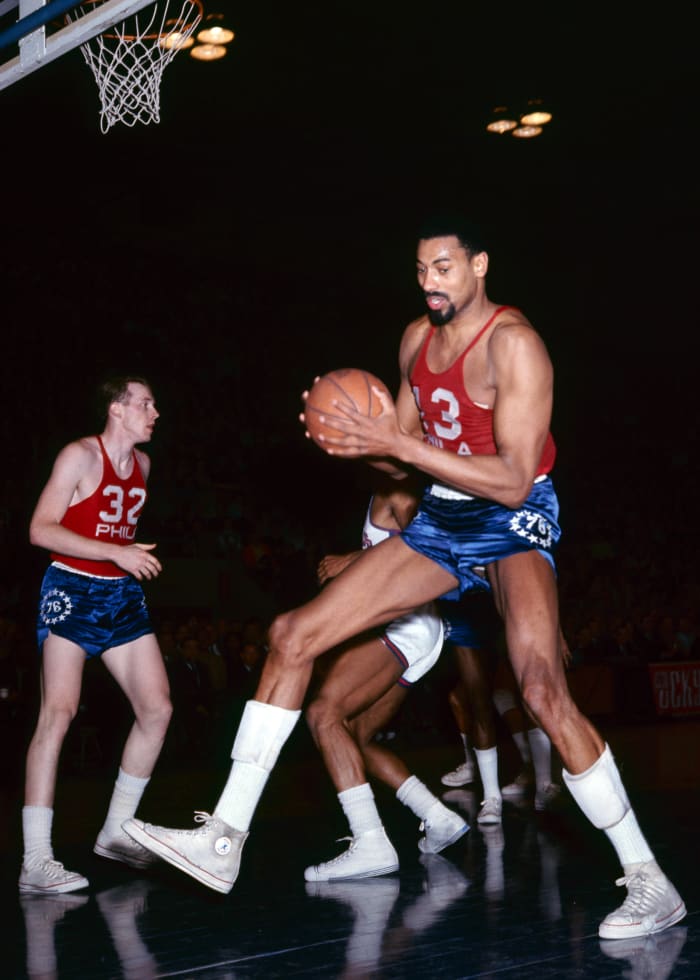
Credit: Malcolm Emmons-USA TODAY Sports
1959-60 MVP Stats: 37.6 PPG, 27.0 RPG, 2.3 APG
As far as MVP seasons go, none have been more impressive from a numbers standpoint than Wilt Chamerlain’s in 1959-60. It was Chamberlain’s rookie season, and he had entered the NBA with monstrous expectations after dominating the NCAA and Harlem Globetrotters circuits. Chamberlain entered the NBA with the Philadelphia Warriors and made an immediate impact on them with his unbelievable play leading to 49 wins and a playoff berth.
Chamberlain took home both the scoring title and rebounding title that same season with 37.6 PPG and 27.0 RPG. Wilt had 60 games with at least 30 points that season, as well as 32 games with at least 40 points. Wilt would also record an incredible 62 games with at least 20 rebounds, as far and away the best at it in the league. As was the case for much of Chamberlain’s career, his team would fall to the Celtics led by Bill Russell in the Eastern Division Finals.
4. Shaquille O’Neal – 2000 MVP Season
1999-00 Stats: 29.7 PPG, 13.6 RPG, 3.8 APG, 0.5 SPG, 3.0 BPG
As it has been well-documented, Shaquille O’Neal’s dominance over the NBA during the early 2000s is one of the greatest peaks for any player ever. For years prior to that, O’Neal had come up just short of delivering a championship to his teams and often let the big game slip through his grasp. That would all change as the NBA entered the 2000s, and the 1999-00 season is what started it all. When we look back at this stretch, it is hard to believe that O’Neal didn’t win more than one MVP. That is why the one he did win ranks so high up on our list here today.
Shaq would take home the second scoring title of his career in 2000, averaging 29.7 PPG. He was the last center to win the scoring title before Joel Embiid did it in 2022. Shaq would have himself 39 games in which he scored at least 30 points as well as nine games with at least 40 points. He recorded 33 games with at least 15 rebounds as well and 46 games with at least three blocks. His defensive game measured up to his offensive dominance, which led to the first Lakers championship since 1988.
3. Stephen Curry – 2016 MVP Season
2015-16 MVP Stats: 30.1 PPG, 5.4 RPG, 6.7 APG, 2.1 SPG, 0.2 BPG
As the 2015 season concluded, it was clear a new era was being ushered into the NBA as Stephen Curry was coming off an MVP season and an NBA championship behind the power of his ridiculous three-point shooting. That ability would be intensified time a million during 2016 when he and the Warriors would blow the NBA record books away. Curry would become the NBA’s first-ever unanimous MVP leading the Warriors to a new NBA record of 73 wins in a single season. Curry won the scoring title and steals title that season while shooting 45.4% from three and recording the only 50/40/90 season of his career.
Curry’s shooting and scoring were on a level that the NBA community has never seen. Curry would have 40 30-point games during his 2016 campaign and 16 games in which he knocked down eight or more three-pointers. Curry would also take home a steals title which is peculiar due to his reputation as a negative defender. Curry’s Warriors would advance to the NBA Finals against the Cavaliers for the second year in a row. In a twisted turn of events, they would blow a 3-1 series lead in the Finals and lose the series squandering what could have been the greatest team and season ever in NBA history.
2. LeBron James – 2013 MVP Season
2012-13 MVP Stats: 26.8 PPG, 8.0 RPG, 7.3 APG, 1.7 SPG, 0.9 BPG
The 2012-13 season was one of the most exciting times to be an NBA fan. LeBron James had fully embraced the villain role assigned to him after leaving Cleveland to form the Avengers in Miami with Chris Bosh and Dwyane Wade. He had just won his first NBA championship and first Finals MVP award in 2012 with a win over Kevin Durant and the Thunder in the NBA Finals. He also wasn’t nearly finished, as he was just entering both his offensive and defensive peak as a player.
James would earn All-Defensive First Team honors for his effort during the 2012-13 season as well as finish runner-up for Defensive Player of the Year. He recorded 17 games with at least three steals and 41 games with at least one block. On the offensive side of the ball, he would have 26 games with at least 30 points and 15 games with at least 10 assists. Once again, LeBron’s all-around play made Miami the team to beat in the NBA. In a dramatic seven-game series between the Heat and Spurs, LeBron prevailed with his second NBA championship and second Finals MVP award in as many years and was well on his way to the GOAT status he has achieved in his career.
1. Michael Jordan – 1988 MVP Season
1987-88 MVP Stats: 35.0 PPG, 5.5 RPG, 5.9 APG, 3.2 SPG, 1.6 BPG
Heading into his fourth season, many knew that Michael Jordan was a superstar due to his legendary playoff performances against the Bucks and Celtics so far in his career. The 1987-88 regular season could be described as Jordan’s best overall season when we take a deeper look, even though it did not result in a championship for the Bulls. Jordan would lead the NBA in scoring for the second straight season, steals, and minutes played to help them win 50 games under coach Doug Collins and another trip to the NBA playoffs.
During this miraculous regular season, Jordan claimed the scoring title by recording 59 games with at least 30 points and 18 games with at least 40. He would also have 55 games with at least three steals as well as 14 games with at least five steals to win the NBA’s Defensive Player of the Year award. During the playoffs, Jordan would average 45.2 PPG in Chicago’s first-round win over the Cavaliers and 27.4 PPG in their second-round loss to Detroit. Jordan and the Bulls were a few seasons away from beginning their reign of terror over the league, but this season was the one where Jordan established himself as the greatest player on the planet at the time and, eventually, of all time.
Source: fadeawayworld




